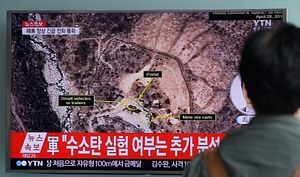With North Korean Supreme Leader Kim Jong-un and South Korean President Moon Jae-in soon to kick off their historic meeting at the inter-Korean border, Chinese scientists reported that Punggye-ri, the only known nuclear test site of North Korea, has collapsed. This may partly explain why Kim suddenly announced that North Korea “no longer needs” to test its weapons capability last week, and promised to dismantle the test site at Punggye-ri.
On April 23, the University of Science and Technology of China (USTC) — one of China’s national research universities under the direct leadership of the Chinese Academy of Sciences — released a study report, confirming that the Punggye-ri nuclear test site, located fewer than 100 miles (160 kilometers) from the Chinese border, has collapsed. The study also claimed that a series of tremors and landslides that took place recently in the area near the site were triggered by North Korea’s latest nuclear test and the ensuing site collapse.
On September 3, 2017, North Korea conducted its sixth nuclear test, causing powerful tremors felt strongly in China. According to USTC’s analysis at that time, the power of the North Korea’s sixth nuclear test was “3 to 7.8 times stronger than that of the Nagasaki atomic bomb — Fat Man — dropped by the United States in 1945.”
The USTC website also released a one-page summary of its research last fall, concluding that (all sic) “The occurrence of the collapse should deem the underground infrastructure beneath mountain Mantap not be used for any future nuclear tests.”
The latest research from USTC has been accepted and is to be published soon by Geophysical Research Letters, a journal of the American Geophysical Union.
In addition to USTC’s findings, Geophysical Research Letters last month published another study, titled “North Korea’s 2017 Test and its Nontectonic Aftershock,” also written by Chinese scientists.
The first author, Liu Junqing, a researcher at the Jilin Earthquake Agency (located just within the Chinese border, near the Punggye-ri nuclear test site) concluded in this study that the September nuclear test explosion “created a cavity and a damaged ‘chimney’ of rocks.”
He continued:
The aftershock was neither a secondary explosion nor a triggered tectonic earthquake. It occurred due to a process comparable to a “mirror image”of the explosion, that is, a rock collapse, or compaction, for the first time documented in North Korea’s test site… Small natural earthquakes also occur at the test site, and geotechnical works might trigger them. Thus, all studies related to rock stability of the site, and prevention of radioactive leakage, are important.
Liu’s concern about radioactive leakage echos USTC’s research, as USTC also urged the authorities to monitor radioactive substances caused by the collapse.
As The Diplomat has been closely following, North Korea’s sixth nuclear test as well as its ensuing earthquake caused strong tremors — both physically and mentally– in China.
Particularly on September 23 last year, a suspected explosion, equal to a 3.4 earthquake, happened close to the Punggye-ri nuclear test site. The event was detected by the China Earthquake Administration (CEA) and seriously agitated the Chinese public.
The CEA later claimed that the quake was a natural occurrence rather than a nuclear detonation. But according to the recent research, that quake, along with others, was triggered by the earlier nuclear test.
However, while these studies conducted by Chinese scientists have been widely circulated on foreign media, so far no Chinese local media has reported on the findings at all.

































